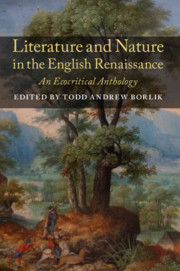Book contents
- Frontmatter
- Contents
- List of Illustrations
- Acknowledgements
- Editorial Principles: Towards the Ecocritical Editing of Renaissance Texts
- Introduction
- PART I Cosmologies
- PART II The Tangled Chain
- Hierarchy and the Human Animal
- Beasts
- Birds
- Fish
- Insects
- Plants
- Gems, Metals, Elements, Atoms
- PART III Time and Place
- PART IV Interactions
- PART V Environmental Problems in Early Modern England
- PART VI Disaster and Resilience in the Little Ice Age
- Appendix A Industrialization and Environmental Legislation in the Early Anthropocene: A Timeline
- Appendix B Further Reading: A Bibliography of Environmental Scholarship on the English Renaissance
Birds
from PART II - The Tangled Chain
Published online by Cambridge University Press: 05 June 2019
- Frontmatter
- Contents
- List of Illustrations
- Acknowledgements
- Editorial Principles: Towards the Ecocritical Editing of Renaissance Texts
- Introduction
- PART I Cosmologies
- PART II The Tangled Chain
- Hierarchy and the Human Animal
- Beasts
- Birds
- Fish
- Insects
- Plants
- Gems, Metals, Elements, Atoms
- PART III Time and Place
- PART IV Interactions
- PART V Environmental Problems in Early Modern England
- PART VI Disaster and Resilience in the Little Ice Age
- Appendix A Industrialization and Environmental Legislation in the Early Anthropocene: A Timeline
- Appendix B Further Reading: A Bibliography of Environmental Scholarship on the English Renaissance
Summary
While beasts talk in many early modern stories, “Speak, Parrot” is one of the few in which this Aesopian fantasy has a shred of credibility. Henry VIII reportedly owned an African grey parrot (some of which possess thousand-word vocabularies), although Skelton's poem describes the rose-ringed parakeet – a species now naturalized in and around London. Besides taking satiric pecks at the greed, vanity, and political squabbling of Henry's courtiers, the bird also lampoons Renaissance humanists and their educational reforms, including education for women. Humanist pedagogues expected their pupils to learn several languages by rote (Skelton's parrot speaks no fewer than nine). In other words, students would often have to parrot back, as it were, the words of their lesson without comprehending them. While some critics suspect the text to be corrupt, the apparent non sequiturs may be Skelton's attempt to mimic the bird's squawking out phrases at random. However, the poet also identifies with the bird in demanding liberty to speak freely, and the poem's levity belies the profundity of the questions it raises about animal intelligence (Boehrer 2002, 99–132). The same can be said of Skelton's “Philip Sparrow,” which both commemorates and spoofs the emotional bond between a young woman and her avian companion, and even features a mock-requiem mass for the dead bird. How does the parrot challenge not only the human monopoly on reason and language but also the exclusive claim to an immortal soul? The beautiful, rational, musical, over-educated, polyglot parrot seems a parodic embodiment of Renaissance humanism's exalted view of humanity.
Source: Certain Books Compiled by Master Skelton (1545), A2r–A2v, A5v.
My name is Parrot, a bird of paradise,
By Nature devised of a wonderous kind,
Daintily dieted with diverse delicate spice,
Till Euphrates, ° that flood, driveth me into Ind, °
Where men of that country by fortune me find,
And send me to great Ladies of estate.
Then Parrot must have an almond or a date,
A cage curiously carven with silver pin, °
Properly painted to be my coverture,
A mirror of glass, that I may toot° therein.
- Type
- Chapter
- Information
- Literature and Nature in the English RenaissanceAn Ecocritical Anthology, pp. 138 - 157Publisher: Cambridge University PressPrint publication year: 2019



